人教版八年级英语下册知识点新编汇总
新人教版|八年级下册英语所有知识点大汇总
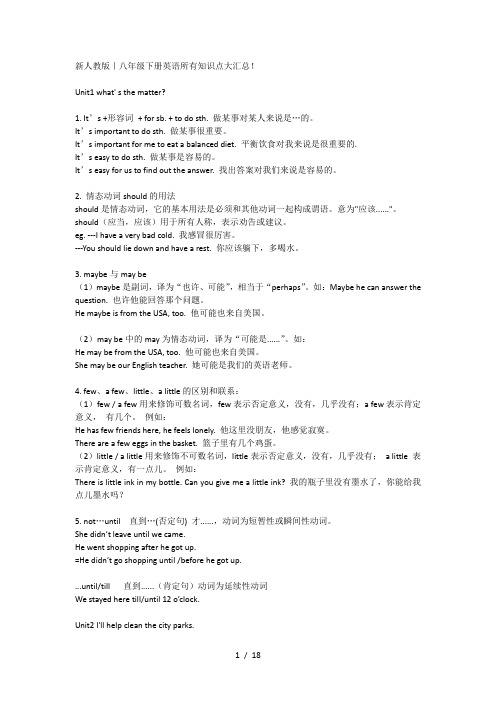
新人教版|八年级下册英语所有知识点大汇总!Unit1 what' s the matter?1. It’s +形容词+ for sb. + to do sth. 做某事对某人来说是…的。
It’s important to do sth. 做某事很重要。
It’s important for me to eat a balanced diet. 平衡饮食对我来说是很重要的.It’s easy to do sth. 做某事是容易的。
It’s easy for us to find out the answer. 找出答案对我们来说是容易的。
2. 情态动词should的用法should是情态动词,它的基本用法是必须和其他动词一起构成谓语。
意为"应该......"。
should(应当,应该)用于所有人称,表示劝告或建议。
eg. ---I have a very bad cold. 我感冒很厉害。
---You should lie down and have a rest. 你应该躺下,多喝水。
3. maybe与may be(1)maybe是副词,译为“也许、可能”,相当于“perhaps”。
如:Maybe he can answer the question. 也许他能回答那个问题。
He maybe is from the USA, too. 他可能也来自美国。
(2)may be中的may为情态动词,译为“可能是......”。
如:He may be from the USA, too. 他可能也来自美国。
She may be our English teacher. 她可能是我们的英语老师。
4. few、a few、little、a little的区别和联系:(1)few / a few用来修饰可数名词,few表示否定意义,没有,几乎没有;a few表示肯定意义,有几个。
例如:He has few friends here, he feels lonely. 他这里没朋友,他感觉寂寞。
202X年新人教版八年级英语下册各知识点归纳总结
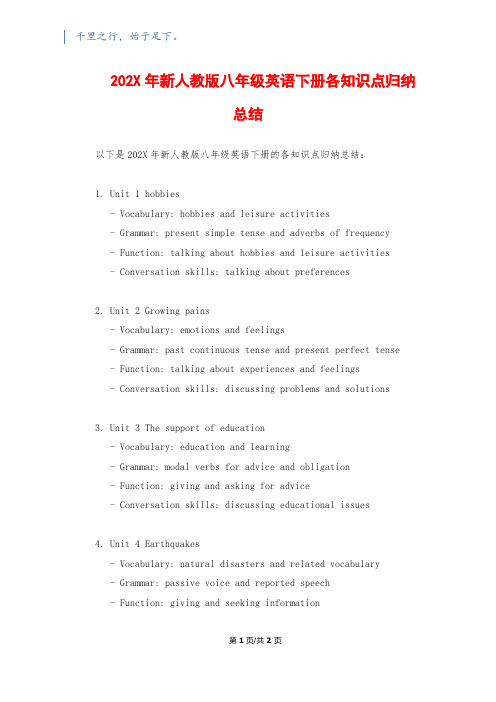
千里之行,始于足下。
202X年新人教版八年级英语下册各知识点归纳总结以下是202X年新人教版八年级英语下册的各知识点归纳总结:1. Unit 1 hobbies- Vocabulary: hobbies and leisure activities- Grammar: present simple tense and adverbs of frequency- Function: talking about hobbies and leisure activities- Conversation skills: talking about preferences2. Unit 2 Growing pains- Vocabulary: emotions and feelings- Grammar: past continuous tense and present perfect tense - Function: talking about experiences and feelings- Conversation skills: discussing problems and solutions3. Unit 3 The support of education- Vocabulary: education and learning- Grammar: modal verbs for advice and obligation- Function: giving and asking for advice- Conversation skills: discussing educational issues4. Unit 4 Earthquakes- Vocabulary: natural disasters and related vocabulary- Grammar: passive voice and reported speech- Function: giving and seeking information第1页/共2页锲而不舍,金石可镂。
新人教版八年级英语下册知识点归纳汇总
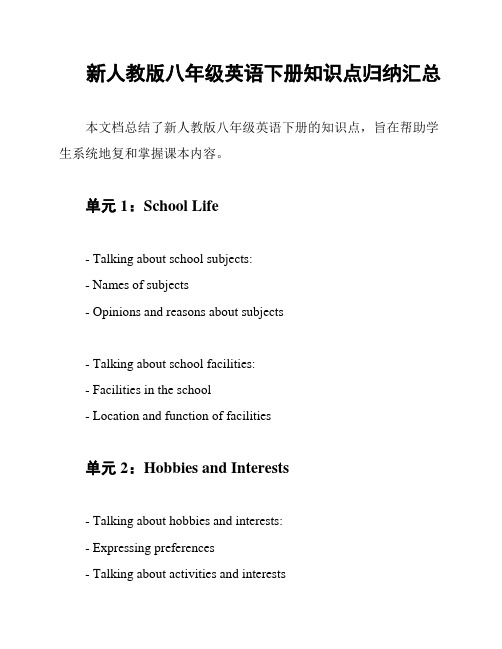
新人教版八年级英语下册知识点归纳汇总本文档总结了新人教版八年级英语下册的知识点,旨在帮助学生系统地复和掌握课本内容。
单元1:School Life- Talking about school subjects:- Names of subjects- Opinions and reasons about subjects- Talking about school facilities:- Facilities in the school- Location and function of facilities单元2:Hobbies and Interests- Talking about hobbies and interests:- Expressing preferences- Talking about activities and interests- Talking about free time:- Discussing how free time is spent- Making plans for free time单元3:Finding A Job- Talking about future jobs:- Discussing future careers- Describing job responsibilities- Talking about skills and qualities:- Describing skills and qualities for different jobs - Discussing personal skills and qualities单元4:Healthy Living- Talking about health and lifestyle:- Discussing healthy habits- Talking about exercise and diet- Talking about illnesses and symptoms: - Giving advice for staying healthy单元5:Going Shopping- Talking about shopping:- Discussing preferences for shopping - Describing shopping experiences- Talking about money:- Discussing prices and quantities单元6:Visiting Places- Talking about places:- Describing famous places- Talking about tourist attractions- Talking about travel plans:- Making travel arrangements- Talking about past travel experiences单元7:Festivals and Celebrations- Talking about festivals and celebrations:- Describing traditional festivals- Talking about cultural celebrations- Talking about activities and traditions:- Describing activities during festivals- Explaining traditions and customs单元8:Environment- Talking about environmental issues:- Discussing environmental problems- Giving suggestions for protecting the environment - Talking about actions and measures:- Describing actions to save the environment- Discussing personal contributions to the environment以上是新人教版八年级英语下册的知识点归纳汇总。
最新人教版八年级英语下册第一单元知识点汇总

最新人教版八年级英语下册第一单元知识点汇总Unit 1 What’s the matter?一、基础知识1.我感冒了。
可以表达为I had a cold、catch a cold或have the flu。
have a fever表示发烧,have a cough表示咳嗽,have a stomachache或肚子疼表示胃疼,have a toothache表示牙疼,have a headache表示头疼。
2.将身体部位和ache(疼痛)结合起来构成新的复合词,如stomach+ache=stomachache,head+ache=headache,tooth+ache=toothache,back+ache=backache,表示相应的疼痛。
3.“怎么啦?出什么事情了?”可以表达为What’ s the matter。
也可以用What’ s the trouble with you?或What’ s wrong with you。
matter和trouble为名词,其前可加the或形容词性物主代词,而wrong是形容词不能加the。
用于询问某人有什么病或遇到什么麻烦、问题,其后跟询问对象时,与介词with连用,如What’s the matter with sb。
= What’s your trouble?= What’s up?= What happens to sb。
举例来说,当问到“What’s the matter with you?”时,回答可以是“I have a bad cold.”4.maybe表示“或许”,常用于句首,表示可能性,后加句子。
例如Maybe you are right。
may be是情态动词+be的结构,意为“可能,也许”,后加名词、代词或形容词。
例如He maybe angry。
sound like可以和名词、代词以及从句结合使用,如It sounds like you don’t know the truth.It sounds like a good idea。
人教版八年级英语下册各知识点归纳总结

人教版八年级英语下册各知识点归纳总结Knowledge Summary of People's Education Edition Eighth Grade English TextbookUnit 1 Dream JobsIn this unit, students learn about different occupations and career paths. They practice talking about their dream jobs and discussing the pros and cons of different professions. Vocabulary includes words related to jobs, such as lawyer, engineer, chef, etc. Grammar points include the present simple tense for expressing routines and habits, as well as future forms for talking about future plans.Unit 2 Healthy EatingThis unit focuses on the importance of a balanced diet and healthy eating habits. Students learn about different food groups, nutrients, and the benefits of eating a variety of foods. Vocabulary includes words related to food, such as carbohydrates, proteins, vitamins, etc. Grammar points include using countable and uncountable nouns, as well as quantifiers such as some, any, much, and many.Unit 3 Travel PlansIn this unit, students learn how to talk about their travel plans and experiences. They practice using travel vocabulary and expressions, as well as giving recommendations for places to visit. Vocabulary includes words related to travel, such as destination, itinerary, accommodation, etc. Grammar points include present perfect tense for talking about past experiences and future forms for making predictions and plans.Unit 4 Environmental ProtectionThis unit focuses on the importance of protecting the environment and taking action to preserve natural resources. Students learn about environmental issues and discuss ways to reduce waste and pollution. Vocabulary includes words related to the environment, such as recycling, renewable energy, pollution, etc. Grammar points include modals of obligation and necessity for giving advice and making suggestions.Unit 5 Festivals around the WorldIn this unit, students learn about different festivals and celebrations from around the world. They practice talking about cultural traditions, customs, and rituals. Vocabulary includes words related to festivals, such as celebrations, traditions, customs, etc. Grammar points include using the present perfecttense to talk about past experiences and cultural differences in expressing gratitude and apologies.Overall, the eighth grade English textbook covers a wide range of topics and language skills, including vocabulary, grammar, speaking, listening, reading, and writing. Students are exposed to a variety of real-life situations and authentic materials to help them develop their language proficiency and communication skills. By the end of the school year, students should feel more confident and competent in using English in different contexts and situations.。
(完整版)最新人教版八年级下册英语全册知识点大全

最新人教版八年级下册英语全册知识点大全Unit 1重点短语:have a stomachache have a cold lie downtake one’s temperature have a fever go to a doctorto one’s surprise agree to (do sth.)get into troublebe used to take risks run out (of)cut off get out of be in control ofkeep on ( doing sth.)give up语言知识归纳:1. What’s the matter (w ith you)?此句用来询问别人的病情。
类似的句子还有:What’s wrong with you?/ What’s the trouble?matter作动词用,意为“要紧”“有关系”,主要用于疑问句和否定句。
What does it matter? It doesn’t matter.【例题】Does it ________ if we can’t finish it today?A. mindB. mindsC. matterD. matters2. I have a sore throat.have “患病”,常用“have a /an+ 名词”.have a cold have a fever have a sore backhave a stomachache have a cough【例题】( )---Does he often have ______ cold? ---Yes. He also _____a cough and a sore throat.A. a; hasB. /; hasC. a; haveD. /; have3.Lie down and rest! 躺下休息lie down 躺下4.That’s probably why. 那可能就是原因。
新版人教版八年级下英语语法重点归纳(全)

新版人教版八年级下英语语法重点归纳(全)一、名词名词是指用来表示人、事物、地方、动物等的名称的词语。
名词分为可数名词和不可数名词。
可数名词有单数和复数两种形式,而不可数名词只有单数形式。
- 可数名词:表示单数时,名词前面通常有冠词a/an或者其它数量词进行修饰;表示复数时,名词通常要在词尾加“s”。
- 不可数名词:不可数名词表示的是无法分为个体的物体、概念、抽象事物等,通常不能用于复数形式。
二、动词动词表示人或物的动作、行为、状态或存在的词语。
动词分为及物动词和不及物动词。
- 及物动词:及物动词后面可以直接接宾语,表示动作的承受者或影响对象。
- 不及物动词:不及物动词不能直接接宾语,它可以后面接副词或介词短语,表示动作发生的方式、状态等。
三、形容词形容词是用来描述名词性词语的词语。
它可以表示人或物的性质、状态、特征、颜色等。
- 形容词可以修饰名词,放在名词的前面。
- 形容词还可以通过加后缀“-er”和“-est”来比较级和最高级。
四、副词副词是用来修饰动词、形容词和其他副词的词语。
副词可以表示时间、地点、方式、程度、频率等。
- 副词在句中通常位于动词、形容词或者其他副词的前面。
- 副词的比较级和最高级可以通过在前面加上more和most来表示。
五、代词代词是用来代替名词或名词性的词语的词语。
代词可以分为人称代词、指示代词、疑问代词、不定代词等。
- 人称代词表示人的身份或人称,包括主格和宾格两种形式。
- 指示代词用来指示特定的人或物,可以表示近处的、远处的或已提到的事物。
- 疑问代词用于提问,通常用来询问人或事物的身份、性质、数量等信息。
- 不定代词用来指代不特定或泛指的人或物,表示数量或程度。
六、冠词冠词是位于名词前面用来修饰名词的词语。
冠词分为定冠词和不定冠词。
- 定冠词指特指某一具体的人或事物,有两种形式:定冠词“The”用于表示特定的人或物,而不定冠词“A/An”用于泛指任意的人或物。
七、介词介词是用来表示人或物之间关系的词语。
人教版八年级英语下册各单元知识点总结完整版

Unit 1 What’s the matter?一、重点短语1. have a fever 发烧2. have a cough 咳嗽3. have a toothache 牙疼4. talk too much 说得太多5. drink enough water 喝足够的水6. have a cold 受凉;感冒7. have a stomachache 胃疼8. have a sore back 背疼9. have a sore throat 喉咙痛10. lie down and rest躺下来休息11. hot tea with honey加蜂蜜的热茶12. see a dentist看牙医13. get an X-ray拍X光片14. take one’ s temperature量体温15. put some medicine on sth在……上面敷药16. feel very hot 感到很热17. sound like 听起来像18. all weekend 整个周末19. in the same way以同样的方式20. go to a doctor 看医生21. go along 沿着……走22. on the side of the road 在马路边23. shout for help 大声呼救24. without thinking twice 没有多想25. get off 下车26. have a heart problem 有心脏病27. to one’ s surprise 使……惊讶的28. thanks to 多亏了;由于29. in time及时30. save a life 挽救生命31. get into trouble 造成麻烦32. right away 立刻;马上33. because of 由于34. get out of 离开35. hurt oneself 受伤36. put a bandage on sth. 用绷带包扎37. fall down 摔倒38. feel sick 感到恶心39. have a nosebleed 流鼻血40. cut his knee割伤他的膝盖41. put her head back 把她的头向后仰42.have problems breathing呼吸困难43. mountain climbing登山运动44. be used to doing sth. 习惯做某事45. run out (of) 用完;用尽46. so that 以便47. so…that 如此……以至于……48. be in control of 掌管;管理49. in a difficult situation 在逆境屮50. keep on doing sth.坚持做某事51. make a decision做出决定52. take risks 冒险53. give up 放弃二、知识点解析1. What’s the matter? 怎么了?若是询问“某人怎么了?”要用“What’s the matter with sb.?”拓展:What’s the matter with sb.? 的同义句:What’s wrong with sb.? / What’s the trouble with sb.?2.疾病类短语:have a +疾病. e.g. :have a fever 发烧have a cold 感冒have a cough 咳嗽.have a +身体部位-ache. e.g.: have a headache 头痛have a toothache 牙痛.have a sore+身体部位. e.g.: have a sore throat咽喉痛have a sore back背痛例题:Mom, I____________.I’m sorry to hear that, dear. We must go to see the dentist right away.A. have a headacheB. have a stomachacheC. have a toothacheD. have a fever3. lie down 躺下V. 躺,平躺。
人教版英语八年级下册知识点总结

人教版英语八年级下册知识点总结一、语法知识点1. 时态:掌握一般现在时、一般过去时、一般将来时、现在进行时、过去进行时、过去将来时等时态的用法。
2. 过去进行时:用于表示过去某一时间正在进行的动作或状态。
3. 以下代词和副词的用法:- somebody, anybody, nobody, everybody 可用作主语或宾语。
- something, anything, nothing, everything 可用作主语或宾语。
- somewhere, anywhere, nowhere, everywhere 可用作地点副词。
4. 句型:掌握各种基本句型,如祈使句、选择疑问句、反义疑问句等。
5. 状语从句:掌握时间、原因、结果、条件等类型的状语从句的用法,并注意从句的引导词。
6. 定语从句:研究使用关系代词 who, whom, whose, which, that 引导定语从句,并了解先行词和关系词在从句中的作用关系。
二、词汇知识点1. 词汇拼写和用法:巩固和扩大基础词汇量,掌握词汇的正确拼写和用法。
2. 同义词和反义词:研究常用的同义词和反义词,提高词汇表达的能力。
3. 词组和固定搭配:掌握常用的词组和固定搭配,能够灵活运用。
三、阅读知识点1. 阅读理解:提高阅读理解能力,掌握快速获取信息的技巧。
2. 阅读策略:研究使用各种阅读策略,如扫读、略读、详读、推断等。
3. 阅读技巧:培养良好的阅读惯和技巧,如划重点、标记陌生单词等。
四、写作知识点1. 写作结构和组织:研究写作时合理安排文章结构和组织思路,使内容连贯。
2. 信息衔接和过渡:掌握信息衔接和过渡的方法,使文章各部分之间有逻辑性。
3. 词汇和句型运用:运用丰富的词汇和多样的句型,提高写作表达的准确性和流畅性。
以上为人教版英语八年级下册的主要知识点总结,希望能帮到你!。
2023年部编人教版英语八年级下册全册知识点归纳

2023年部编人教版英语八年级下册全册知识点归纳本文档旨在归纳2023年部编人教版英语八年级下册全册的知识点。
以下是各个单元的重点内容:Unit 1: What’s the matter?- Vocabulary:- Health and illness-related words and phrases- Grammar:- Present continuous tense for talking about current health problems - Expressing and responding to health issues and giving adviceUnit 2: How often do you exercise?- Vocabulary:- Words and phrases related to leisure activities and exercise- Grammar:- Adverbs of frequency to talk about routine activities- Present simple tense for making generalizations- Discussing exercise routines and habitsUnit 3: Why don’t you get her a scarf?- Vocabulary:- Words and phrases related to gifts and shopping- Grammar:- Imperatives for making suggestionsUnit 4: I want to be an actor.- Vocabulary:- Words and phrases related to professions and aspirations- Grammar:- Future plans using "want to" and "going to"- Talking about future goals and aspirationsUnit 5: What were you doing when the rainstorm came?- Vocabulary:- Words and phrases related to past activities and weather events- Grammar:- Past continuous tense for talking about interrupted activities- Describing past events and experiencesUnit 6: Do you like bananas?- Vocabulary:- Words and phrases related to food preferences and dietary habits- Grammar:- Questions and short answers for asking about preferences- Expressing likes and dislikes以上是2023年部编人教版英语八年级下册全册的知识点归纳。
人教版八年级英语下册各知识点归纳总结

千里之行,始于足下。
人教版八年级英语下册各知识点归纳总结
人教版八年级英语下册的各知识点归纳总结如下:
1. 职业和家庭:学习如何描述职业、谈论家庭成员和家庭活动,如询问职业、描述人物、说明工作地点等。
2. 爱好和兴趣:学习如何描述爱好和兴趣,如谈论体育运动、音乐、电影、读书等。
3. 交通和旅行:学习如何描述交通工具、问路和旅行方面的话题,如描述公共交通工具、询问路线、购买车票等。
4. 环保与保护:学习如何描述环保和保护环境的行为,如讨论环境问题、讨论减少污染的方法、倡导保护野生动植物等。
5. 书信和便条:学习如何写书信和便条,如写自我介绍信、道歉信、邀请信等。
6. 教育和学习:学习如何描述学校和学习,如谈论学校设施、描述学习方法、讨论学业压力等。
7. 健康和饮食:学习如何描述健康和饮食,如谈论健康习惯、讨论饮食结构、询问健康问题等。
8. 动物和自然:学习如何描述动物和自然景观,如描述动物的特征、描述自然场景、讨论保护动物和自然的重要性等。
第1页/共2页
锲而不舍,金石可镂。
9. 文化和传统:学习如何描述文化和传统活动,如讨论节日、描述传统习俗、谈论文化差异等。
10. 社会问题和解决方案:学习如何描述社会问题和提出解决方案,如谈论青少年问题、讨论解决社会问题的方法等。
以上是人教版八年级英语下册的各知识点的归纳总结,供您参考。
人教版八年级下册英语必考知识点梳理(期末复习必备)

人教版八年级下册英语必考知识点梳理(期末复习必备)八年级下册英语知识点Unit 1 What’s the matter?【重点短语】1.have a fever 发烧2.have a cough 咳嗽3.have a toothache 牙疼4.talk too much 说得太多5.drink enough water 喝足够的水6.have a cold 受凉;感冒7.have a stomachache 胃疼8.have a sore back 背疼9.have a sore throat 喉咙痛10. take risks 冒险11.hot tea with honey 加蜂蜜的热茶12.see a dentist 看牙医13.get an X-ray 拍X 光片14.take one’s temperature 量体温15.put some medicine on sth. 在……上面敷药16. give up 放弃17. sound like 听起来像18. all weekend 整个周末19. in the same way 以同样的方式20. go to a doctor 看医生21. go along 沿着……走22. on the side of the road 在马路边23. shout for help 大声呼救24. without thinking twice 没有多想25. get off 下车26. have a heart problem 有心脏病27. to one’s surprise 另某人惊讶的是28. thanks to 多亏了;由于29. in time 及时30. make a decision 做出决定31. get into trouble 造成麻烦32. right away 立刻;马上33. because of 由于34. get out of 离开;从……出来35. keep on doing sth. 继续或坚持做某事36. put a bandage on sth. 用绷带包扎37. fall down 摔倒38. feel sick 感到恶心39. have a nosebleed 流鼻血40. cut his knee 割伤他的膝盖41. put her head back 把她的头向后仰42. have problems breathing 呼吸困难43. mountain climbing 登山运动44. be used to doing sth. 习惯做某事45. run out (of) 用完;用尽46. so that 以便47. so...that... 如此……以至于...…48. be in control of 掌管;管理49. in a difficult situation 在闲境中【重点句型】1. What's the matter with you?= What'the trouble with you? = What's wrong with you? 你怎么了?2. What should she do? 她该怎么办呢?3.Should I take my temperature? 我应该量一下体温吗?4.You should lie down and rest. 你应该躺下休息一会儿。
新人教版英语八年级下册知识点汇总

新人教版英语八年级下册知识点汇总Unit 1: Where Did You Go on Vacation?- Vocabulary related to vacation activities, places, and transport - Past simple tense for regular and irregular verbsUnit 2: What's the Matter?- Vocabulary related to health and illnesses- Expressing and responding to physical and emotional conditions - Imperative sentences for giving advice and making suggestionsUnit 3: How Do You Get to School?- Vocabulary related to modes of transportation and directions- Present simple tense for talking about daily routines and habits - Asking and giving directionsUnit 4: What's the Best Movie Theater?- Vocabulary related to movies and movie theaters- Expressing opinions and preferencesUnit 5: Do You Want to Watch a Game Show?- Vocabulary related to TV programs and game shows- Present continuous tense for talking about activities happening now- Expressing desires and making invitations- Vocabulary related to university majors and future plans- Be going to for talking about future intentions- Asking and answering questions about future plansUnit 7: Will people have robots?- Vocabulary related to technology and the future- Will future tense for making predictions- Expressing possibilities and probabilitiesUnit 8: What will you do if you have a million dollars?- Vocabulary related to hypothetical situations and dreams- Using if clauses and will future tense to talk about hypothetical situations- Expressing desires and making plans for the futureUnit 9: When was it invented?- Vocabulary related to inventions and inventors- Past perfect tense for talking about actions that happened before another past action- Asking and answering questions about the history and origins of thingsUnit 10: By the time I got outside, the bus had already left.- Vocabulary related to everyday activities and past events- Expressing actions that happened before another past actionUnit 11: How do you make a banana milk shake?- Vocabulary related to cooking and recipes- Imperatives for giving instructions- Expressing step-by-step processesUnit 12: The mystery of the broken window- Vocabulary related to crime and detective work- Past continuous tense for talking about past actions in progress- Describing ongoing situations in the pastUnit 13: Rainy days make me sad.- Vocabulary related to weather and emotions- Expressing feelings and emotions- Using cause and effect sentences可以根据每个单元的知识点进行详细讲解和练习,以帮助学生巩固和加深对英语知识的理解。
新人教版八年级下册英语知识点
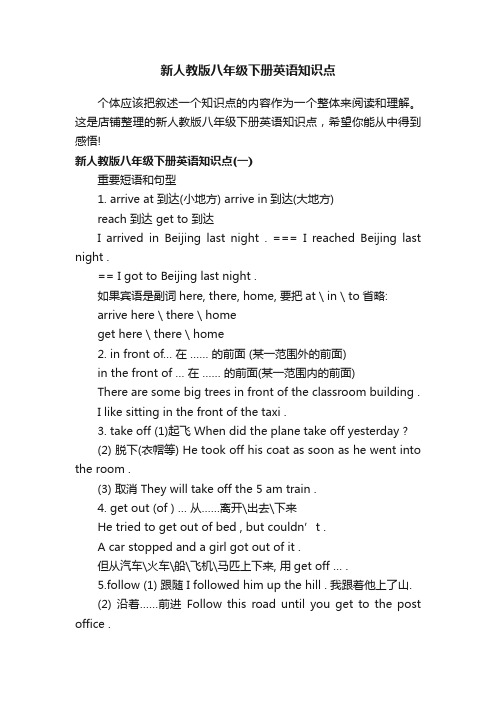
新人教版八年级下册英语知识点个体应该把叙述一个知识点的内容作为一个整体来阅读和理解。
这是店铺整理的新人教版八年级下册英语知识点,希望你能从中得到感悟!新人教版八年级下册英语知识点(一)重要短语和句型1. arrive at 到达(小地方) arrive in到达(大地方)reach 到达 get to 到达I arrived in Beijing last night . === I reached Beijing last night .== I got to Beijing last night .如果宾语是副词here, there, home, 要把at \ in \ to省略:arrive here \ there \ homeget here \ there \ home2. in front of… 在…… 的前面 (某一范围外的前面)in the front of … 在…… 的前面(某一范围内的前面)There are some big trees in front of the classroom building .I like sitting in the front of the taxi .3. take off (1)起飞 When did the plane take off yesterday ?(2) 脱下(衣帽等) He took off his coat as soon as he went into the room .(3) 取消 They will take off the 5 am train .4. get out (of ) … 从……离开\出去\下来He tried to get out of bed , but couldn’t .A car stopped and a girl got out of it .但从汽车\火车\船\飞机\马匹上下来, 用get off … .5.follow (1) 跟随 I followed him up the hill . 我跟着他上了山.(2) 沿着……前进Follow this road until you get to the post office .顺着这条路一直到邮局.(3) 听懂,理解Could you speak more slowly ? I can’t follow you .(4 )follow sb. to do sth. 跟着某人做某事Please follow me to read the story .6. amazing 形容词,修饰名词令人惊奇的, 令人惊讶的what an amazing book !amaze 动词使某人惊讶 Your letter amazed me .be amazed at … 对…… 感到惊讶 Everyone was amazed at the bad news .7. shout at 大声喊叫多指因生气而非善意的大声叫喊Don’t shout at the little boy . He is too young .shout to 大声喊叫多指因距离远而不得不大声叫喊We should shout to him , or he can’t hear us .8. happen 发生具体事件偶然的没有预见的发生(1 ) happen to do sth. 碰巧做某事I happened to meet one of my old friends in the park yesterday .(2 ) sth happens to sb. 某人发生了某事An car accident happened to him last month .上个月他发生了交通事故.take place发生 (1) 按计划进行或按计划发生Great changes have taken place in China in recent years .最近几年中国发生了巨大的变化.(2 ) (运动\ 活动\会议等) 举行The meeting will take place next Friday .take the place of 代替, 取代Plastics can sometimes take the place of wood and metal .塑料有时能代替木材和金属.take one’s place 坐某人的位置, 代替某人的职务.Come to take my place . my seat is near the window .9. anywhere 任何地方常用于否定句或疑问句中.Did you go anywhere last night ? You can’t get it anywhere .somewhere 某个地方用于肯定句come and see me . Then we’ll go out somewhere .everywhere 处处, 到处 === here and thereI can’t find m y pen though I looked for it everywhere\ here and there .10. silence 名词, 寂静 \ 无声There’s nothing but silence in the room . 屋内寂静无声 .Keep in silence . 保持沉默.silent 形容词, 沉默的, 寂静的The old house was quite silent . 这所老房子寂静无声.The cat moved on silent feet . 那只猫无声地走动着.11. hear 听到 Can you hear someone knocking at the door ?(1) hear of 听说 , 后接表示人或物的词I have never heard of him before . 我以前从来没有听说过他.( 2 ) hear about 听说, 后接表示事件的名词I’ve just heard about his illness .我刚刚听说他生病的事.Have you heard about the accident ? 你听说了那场事故吗?(3 ) hear from 收到某人的来信I heard from my daughter in New York yesterday .我昨天收到在纽约的女儿的来信.12. 主语 + be + one of the + 形容词最高级 + 复数名词 + in \ of 短语 .…… 是……中最……的……之一.This was one of the most important events in modern American history .这是美国历史上最重要的事件之一.Shanghai is one of the most beautiful cities in china .13. experience (1)名词经验, 不可数名词 ; 经历, 体验, 可数名词Have you had any experience of fishing ? 你有钓鱼的经验吗?Could you tell us about your experiences in Africa ?你能给我们谈谈你在非洲的经历吗?(2) 动词经历, 感觉The children experienced many difficulties this time .这次孩子们经历了许多困难.experienced 形容词有经验的be experienced in \at doing sth. == have much experience in \ at doing sth.做某事很有经验.She is an experienced teacher .他是一个经验丰富的教师.He is very experienced in \at repairing cars . 他修车很有经验.14. as … as … 和…… 一样… . 两个as之间用形容词或副词的原形.He works as carefully as she . 他和她一样工作认真.She is as tall as her mother . 她和母亲一样高.not as … as…. 不如某人…he isn’t as \ so old as he looks . 他不像看起来那么老.She doesn’t run as \ so fast as her brother .她不如她哥哥跑得那么快.15. have fun == have a good\ great\ wonderful time ==enjoy oneself玩得开心,过得愉快Did you have fun at the party ?== Did you have a good\ great \ wonderful time ?== Did you enjoy yourself ?have fun doing sth.开心做某事I’m just having fun playing the guitar .16. accident 事故, 意外遭遇 He was killed in an accident .他死于一起意外事故.traffic accident 交通事故 Many people die in traffic accidentsevery year .by accident 偶然, 意外地 We met at the airport by accident .17. scared 恐惧的, 害怕的afraid恐惧的, 害怕的I’m very scared \ afraid . 我很害怕.be scared \ afraid of sth 害怕某物 Are you scared \ afraid of snakes ?be scared \ afraid to do sth害怕做某事He is scared \ afraid to go out at night .be scared \ afraid of doing sth害怕做某事He is scared \ afraid of going out at night .18. think about 考虑(某个计划) They are thinking about moving to Beijing .think of 认为 What do you think of the movie ?=== how do you like the movie ?你认为这部电影怎么样?think over 仔细思考 We need a few days to think over this matter .新人教版八年级下册英语知识点(二)感叹句.1. what 引导的感叹句(1) What a beautiful girl (she is ) ! 多么美的姑娘呀 !(2) What a clever boy ( he is ) ! 多么聪明的男孩呀 !(3) What interesting pictures ( they are ) ! 多么美的图片呀 !(4) What tall buildings ( they are ) ! 多么高的楼呀 !(5) What delicious food ( it is ) ! 多么可口的食物呀 !(6) What bad weather ( it is ) ! 多么坏的天气呀 !规律: what + ( a\ an ) + 形容词 + 名词 ( + 主语 + 谓语) + !名词为不可数名词或复数名词时, 形容词前面不能有a\ an .2. how 引导的感叹句(7) How heavy the box is ! 多么重的箱子呀!How fast he runs ! 他跑得多快呀!(8) How careful the girl is ! 多么细心的姑娘呀!How well she plays the piano ! 她的钢琴弹得多好呀!如果说明的是人或物, 两种感叹句可替换. ( 以上(1) 到(8) 句 )新人教版八年级下册英语知识点(三)过去进行时:1.过去进行时的用法:(1)过去某一时刻正在进行的动作。
人教版新八年级下册英语知识点总结1—8单元
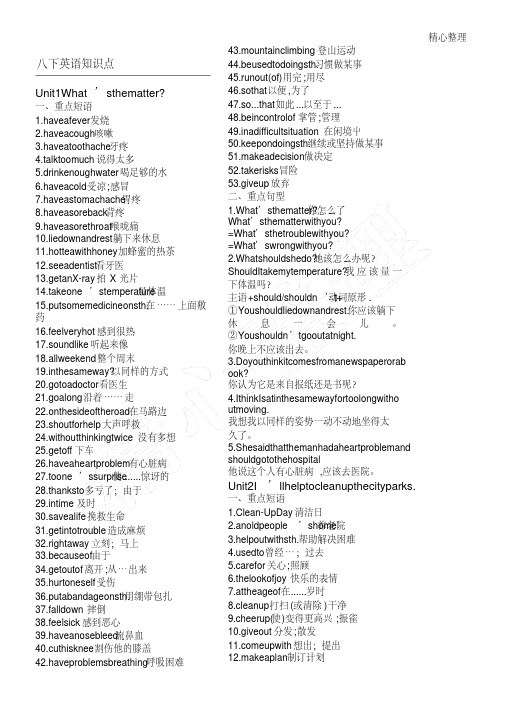
34.haveafightwithsb.与某人吵架 petewithsb.与某人竞争 36.freetimeactivities 业余活动 37.getbettergrades取得更好的成绩 38.giveone ’ sopin提ion出某人的观点 39.learnexamskills 学习应试技巧 40.practicesports体育训练 41.causestress造成压力
24.mindsb.doingsth.介意某人做某事
的事
25.allthetime 一直
二、重点句型
26.infuture 今后
1. Couldyouplease … ..dosth.?
27.makesb.angry使某人生气
Couldyoupleasecleanyourroom?
28.worryaboutsth.担心某事
八下英语知识点
Unit1What ’ sthematter?
一、重点短语 1.haveafever发烧 2.haveacough咳嗽 3.haveatoothache牙疼 4.talktoomuch 说得太多 5.drinkenoughwater 喝足够的水 6.haveacold受凉 ;感冒 7.haveastomachache胃疼 8.haveasoreback背疼 9.haveasorethroat喉咙痛 10.liedownandrest躺下来休息 11.hotteawithhoney加蜂蜜的热茶 12.seeadentist看牙医 13.getanX-ray 拍 X 光片 14.takeone ’ stempera量tur体e 温 15.putsomemedicineonsth在. …… 上面敷 药 16.feelveryhot 感到很热 17.soundlike 听起来像 18.allweekend 整个周末 19.inthesameway?以同样的方式 20.gotoadoctor看医生 21.goalong 沿着 …… 走 22.onthesideoftheroad在马路边 23.shoutforhelp 大声呼救 24.withoutthinkingtwice 没有多想 25.getoff 下车 26.haveaheartproblem有心脏病 27.toone ’ ssurpr使ise.......惊讶的 28.thanksto多亏了;由于 29.intime 及时 30.savealife 挽救生命 31.getintotrouble 造成麻烦 32.rightaway 立刻;马上 33.becauseof由于 34.getoutof 离开 ;从 …出来 35.hurtoneself 受伤 36.putabandageonsth用. 绷带包扎 37.falldown 摔倒 38.feelsick 感到恶心 39.haveanosebleed流鼻血 40.cuthisknee割伤他的膝盖 42.haveproblemsbreathing呼吸困难
(完整版)人教版部编版八年级下册英语第三单元复习知识点梳理

(完整版)人教版部编版八年级下册英语第三单元复习知识点梳理
1. 语法知识点
- 一般现在时:表示经常性动作或现在的状态
- 一般过去时:表示过去发生或存在的动作或状态
- 现在进行时:表示现在正在进行的动作
- 过去进行时:表示过去某一时刻正在进行的动作
- 现在完成时:表示过去某一时刻发生的动作对现在产生的影响
- 过去完成时:表示过去某一时刻之前已完成的动作
2. 词汇知识点
- 动词的不定式
- 预先研究一些常见的动词短语
- 研究动词的过去分词形式
- 研究一些常见的形容词和副词
3. 句型知识点
- 肯定句:主语 + 动词 + 其他成分
- 否定句:主语 + 动词 + not + 其他成分
- 一般疑问句:助动词/系动词 + 主语 + 动词 + 其他成分?
- 特殊疑问句:疑问词 + 一般疑问句
4. 对话和情景交际
研究并熟悉课本中的对话和情景交际,理解对话中的语言表达和交流。
5. 阅读理解
通过阅读短文,理解文章大意,研究并掌握一些常见的词汇和表达方式。
6. 写作技巧
- 研究常用句式和表达方式
- 练写一些简短的句子和段落
- 注意语法和拼写错误的纠正
以上是人教版部编版八年级下册英语第三单元的复知识点梳理,希望对你的研究有所帮助。
*注意:此文档梳理的内容来源于人教版部编版八年级下册英
语教材,仅供参考学习使用。
*。
人教版初中英语八年级下册全册各单元知识点、语法归纳整理
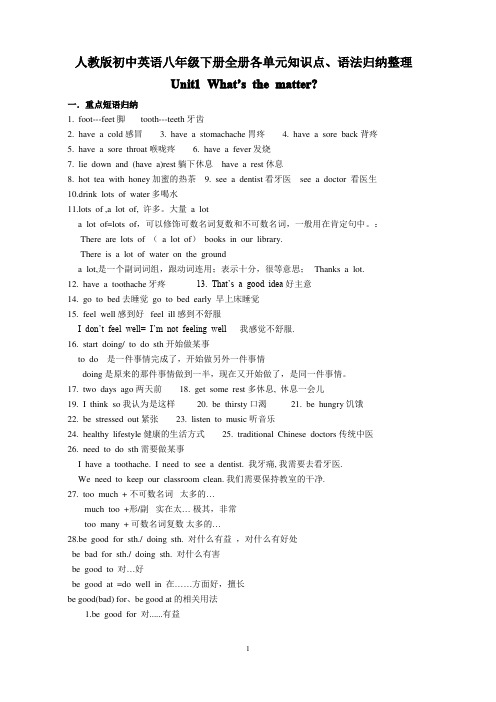
人教版初中英语八年级下册全册各单元知识点、语法归纳整理Unit1W hat’s the matter?一.重点短语归纳1.foot---feet脚tooth---teeth牙齿2.have a cold感冒3.have a stomachache胃疼4.have a sore back背疼5.have a sore throat喉咙疼6.have a fever发烧7.lie down and(have a)rest躺下休息have a rest休息8.hot tea with honey加蜜的热茶9.see a dentist看牙医see a doctor看医生10.drink lots of water多喝水11.lots of ,a lot of,许多。
大量a lota lot of=lots of,可以修饰可数名词复数和不可数名词,一般用在肯定句中。
:There are lots of(a lot of)books in our library.There is a lot of water on the grounda lot,是一个副词词组,跟动词连用;表示十分,很等意思;Thanks a lot.12.have a toothache牙疼13.That’s a good idea好主意14.go to bed去睡觉go to bed early早上床睡觉15.feel well感到好 feel ill感到不舒服I don’t feel well=I’m not feeling well我感觉不舒服.16.start doing/to do sth开始做某事to do是一件事情完成了,开始做另外一件事情doing是原来的那件事情做到一半,现在又开始做了,是同一件事情。
17.two days ago两天前18.get some rest多休息,休息一会儿19.I think so我认为是这样20.be thirsty口渴21.be hungry饥饿22.be stressed out紧张23.listen to music听音乐24.healthy lifestyle健康的生活方式25.traditional Chinese doctors传统中医26.need to do sth需要做某事I have a toothache.I need to see a dentist.我牙痛,我需要去看牙医.We need to keep our classroom clean.我们需要保持教室的干净.27.too much+不可数名词太多的…much too+形/副实在太…极其,非常too many+可数名词复数太多的…28.be good for sth./doing sth.对什么有益,对什么有好处be bad for sth./doing sth.对什么有害be good to对…好be good at=do well in在……方面好,擅长be good(bad) for、be good at的相关用法1.be good for对......有益Doing morning exercises is good for your health.做早操对你们的建康有益。
2023年新人教版八年级英语下册各知识点归纳总结

秋新人教版八年级英语下册各知识点归纳总结Unti1 what’s the matter?短语归纳1.too much 太多2.lie down 躺下3.get an X-ray 做个X光检查4.take one ’s temperature 量体温5.put some medicine on ......在....上敷药6.have a fever 发热7.take breaks /take a break 休息8.without thinking twice 没多想9.get off 下车10.take sb to the hospital 送某人去医院11.wait for等待12.to one’s surprise 使.......惊讶旳thanks to多亏于;由于14.in time及时15.think about 考虑16.have a heart problem患有心脏病17.get into the trouble 碰到麻烦18.do the right thing做对旳旳事情事情19.fall down 摔倒20.put ...... on sth把...放在某物上21.get hit/sunburned 摔伤/烧伤22.be interested in 对.....感爱好23.be used to 习惯于.... 24.take risks/take a risk 挑战25.lose one’s life 失去生命26.because of 由于27.run out of 用完28.cut off 切除29.get out of 从...出来30.make a decision/decisions 做决定31.be in control of 掌管;管理32.give up 放弃使用方法归纳1.need to do sth .需要去做某事2.see sb doing sth 看见某人正在做某事3.ask sb sth 问询某人某事4.expect sb to do sth 期望某人做某事5.agree to do sth 想要做某事6.help sb (to) do sth 协助某人做某事7.want to do sth 想要做某事8.tell sb to do sth 告诉某人做某事9.have problems(in) doing sth 做某事有困难e sth to do sth用某物去做某事11.be/get used to doing sth 习惯于做某事12.seem to do sth 仿佛做某事13.keep on doing sth 继续做某事14.mind doing sth 介意做某事语法点1.问询某人旳健康问题及碰到麻烦旳体现措施2.情态动词should旳使用方法情态动词should旳使用方法表达劝说与提议,也表义务与责任第一人称问句中,征询提议要记清3.不定代词旳使用方法有关阅读措施推理判断阅读法精细解读1. What’s the matter (wi th you)? 怎么了?出什么事了?What’s the trouble/ the problem / wrong with sb./ sth.?2. I had a cold.我感冒了。
人教版英语八年级下册知识点总结汇编

八年级英语下册语法知识复习1.should 情态动词,应该,应当,用于询问,提出建议,或表达职责和义务。
如:What should I do? You should have a talk with your parents.could 也可以提出建议,比较委婉。
如:You could write him a letter.could还用于礼貌地请求,如:Could you please clean your room? 否定句式:Could you please not do sth?其他常用情态动词:must必须,have to必须,不得不,may可能,可以,can能,会,可能,可以need需要。
情态动词+动词原形作谓语。
2.非谓语动词形式(一)动词不定式结构:to+动词原形或不带to。
否定:not+to do或not do句法功能:1)主语:常用it作形式主语,不定式为真正的主语:It is +形容词+for sb. to do sth.It is important to keep fit. =To keep fit is important.2)宾语:(1)直接宾语:想,喜欢,希望:want, like, love, would like, hope, expect; 决定同意拒绝开始学习:decide, agree, refuse, begin, start, learn, 需要计划帮助提供:need, plan,help,offer+ to do(划线的动词还可以接doing)如:I’ll help to clean up the city parks。
(宾语)疑问词(what, who, which, where, when ,how,)+to do 作宾语I don’t know what to say. 我不知道说什么。
(2)宾补:tell,ask,want,wish,allow,invite,help,encourage,teach等+ sb. to do (hope不能接sb.to do)She asked me to say sorry. 她让我道歉。
人教版八年级下册英语知识点梳理总结

千里之行,始于足下。
人教版八年级下册英语知识点梳理总结人教版八年级下册的英语知识点主要包括以下内容:
1. 时态和语态
- 现在进行时
- 一般过去时
- 过去进行时
- 一般将来时
- 用被动语态表达
- 过去将来时
2. 介词
- 表示时间的常用介词
- 表示地点的常用介词
- 表示方式的常用介词
- 表示原因的常用介词
- 表示目的的常用介词
- 表示比较的常用介词
- 表示运动方向的常用介词
3. 短语和固定搭配
- 动词短语
- 名词短语
- 形容词短语
4. 从句
- 定义性从句
第1页/共3页
锲而不舍,金石可镂。
- 修饰性从句
- 原因状语从句
- 结果状语从句
- 条件状语从句
- 目的状语从句
- 时间状语从句
- 地点状语从句
5. 连词
- 并列连词
- 选择连词
- 原因连词
- 结果连词
- 条件连词
- 转折连词
- 目的连词
- 时间连词
- 地点连词
6. 数词
- 基数词
- 序数词
- 分数和百分数
7. 非谓语动词
- 不定式
- 动名词
- 现在分词
- 过去分词
- 不定式作定语
千里之行,始于足下。
以上是人教版八年级下册英语知识点的梳理总结,希望能对你有所帮助。
如有任何更多的问题,请随时提问。
第3页/共3页。
- 1、下载文档前请自行甄别文档内容的完整性,平台不提供额外的编辑、内容补充、找答案等附加服务。
- 2、"仅部分预览"的文档,不可在线预览部分如存在完整性等问题,可反馈申请退款(可完整预览的文档不适用该条件!)。
- 3、如文档侵犯您的权益,请联系客服反馈,我们会尽快为您处理(人工客服工作时间:9:00-18:30)。
Unit 1 What’s the matter?重点:1. 情态动词should & shouldn’t 的用法;2. have + 疾病;3. 反身代词的用法。
难点:能询问并表述身体的种种不适以及对他人身体的种种不适给予适当的建议。
知识点:What’s the matter? 怎么了?What’s the matter with you? = What’s the trouble with you? = What’s wrong with you? 你怎么了?have a cold = catch a cold 感冒have a stomachache 胃痛have a sore + 部位……痛lie down 躺下take one’s temperature 量体温have a fever 发烧have a cough 咳嗽take breaks 休息get an X-ray 拍X光片away from 远离on the side of the road 在马路边shout for help 大声呼救get off 下车to one’s surprise 出乎某人意料thanks to 多亏;由于in time 及时right away 马上,立即get into 陷入get into trouble 陷入困境have a toothache 牙痛put one’s head down 低头have a nosebleed 流鼻血put a bandage on sth. 用绷带包扎get hit on the head 砸到头(注意v. + on the + 身体部位的表达方达)be interested in 对……感兴趣There were many times when … (when 引导的定语从句)be used to doing sth. 习惯做某事take risks 冒险because of 因为in … situation 处于……境地run out 用光get out of 逃离of importance = important (of + n. = adj.)be in control of 管理make a decision 做决定give up 放弃Unit 2 I’ll help to clean up the city parks.重点&难点:1. 不定式作宾语、状语和宾补的用法;2. could表建议时的用法;3. 掌握短语:run out of, take after, fix up, give away等;4. 学会用will和would like表达意愿。
知识点:clean up 清洁Clean-Up Day 清洁日city park 城市公园cheer up 使振奋give out 分发,散发after-school study program 课外学习活动put off 推迟make a plan 制定计划come up with 想出,提出used to do 曾经care for 照顾at the age of 在……岁的时候try out 参加……选拔work for 为……工作,为……效力dream come true 实现梦想learn to do 学习做某事put up 张贴hand out 分发call up 呼吁,召集volunteer one’s time to do 志愿花时间做某事raise money 募捐run out of 用光……take after = be similar to 与……相似fix up = repair 修理give away 捐赠set up 建立disabled people 残疾人a friend of mine 亲密朋友be excited about 对……感到兴奋Unit 3 Could you please clean your room?重点:学习并掌握could表提出请求和征求许可的用法,“Could you please do sth.?” “Could I please do sth.?”难点:用所学知识在实际的生活中委婉地表达自己的请求和征求许可。
知识点:do the dishes 洗碗take out rubbish 扔垃圾fold one’s clothes叠衣服sweep the floor 扫地make one’s bed 铺床clean the living room 打扫客厅go out for dinner 出去吃饭stay out late 在外面待到很晚get a ride 搭车work on 从事finish doing sth. 完成做某事be enough for sb. 对某人来说是足够的be enough to do sth. 做某事是足够的be back from sw. 从……回去(来)be back from doing sth. 做完某事回去(来)clean and tidy 干净整洁come home from school / work 放学/下班回家throw down 扔下come over 过来take … for a walk 带……去散步shout back 大声回应in surprise 惊讶地as soon as 一……就……hang out 闲逛pass sb. sth. 递给某人某物lent sb. sth. 借给某人某物borrow 借入lent 借出try not to do 尝试不做某事get sth. wet 使某物变湿do chores 干杂活hate sth. / doing sth. / to do sth. 讨厌某物/做某事help sb. with sth. / (to) do sth. 帮助某人(做)某事a waste of time 浪费时间spend one’s time on sth. / (in) doing sth. 花费时间在某物上/做某事in order to 为了get good grade 取得好成绩get into a good university 考进好大学no need for sb. to do sth. 不需要某人做某事provide sth. for sb. = provide sb. with sth. 提供某人某物mind doing sth. 介意做某事depend on 依赖develop children’s independence 培养孩子的独立性teach sb, how to do sth. 教会某人做某事do one’s part in doing 做某人份内的事look after = take care of 照顾as a result 结果the + 比较级…,the + 比较级越……越……、Unit 4 Why don’t you talk to your parents?重点:1. 学习并掌握反问句“Why don’t you do sth.?”;2. 连词until, so that, although的运用。
难点:知识点:get enough sleep 有足够的睡眠have time to do sth. 有时间做某事allow sb. to do sth. 允许某人做某事after-school class 补习班get into 陷入a fight with sb. 和某人有争执What’s wrong? 哪儿不舒服?on the phone 在电话里头call sb. up 打电话给某人take sb. to sw. 带某人去某地look through 快速查看be angry with sb. 对某人生气forget about sth. 忘记某事a big deal 重要的事work out 解决get on with = get along with 和睦相处if / whether 引导的选择条件句hang over 悬挂be nice to sb. 对某人好refuse to do 拒绝做某事instead的用法whatever, whenever, wherever, howeveroffer to help 提供帮助proper communication 适当的沟通communicate with 和……沟通be better for sb. 对某人来说更好make sth. clear 使某事清晰be afraid of doing sth. 害怕做某事along 单独的(表面上)lonely 孤独的(内心)be busy on sth. 忙于做某事come out 删除compare sth. with sth. 拿……和……作比较turn down 调低,调小turn up 调高,调大turn on 打开turn off 关掉in one’s opinion 以某人的观点Unit 5 What were you doing when the rainstorm came?重点&难点:学习并掌握when和while引导的时间状语从句以及过去进行时的运用。
知识点:at the time of 在……的时候on the street 在大街上in the road 在马路上at the bus stop 在公交车站take a shower 洗澡take a hot shower 洗热水澡miss the bus 没赶上公交车,错过公交车go off (闹钟)发出响声pick up 接电话put … over … 把……放置于……上方make dinner 做晚饭beat against sth. 拍打某物at first 首先,一开始fall asleep 入睡die down 逐渐消失break … apart 使……分离in a mess 一团糟each other 互相heavy rain 大雨car wash 洗车have a look 瞧一瞧walk by 经过make one’s way to 在某人去……的路上You’re kidding. 你开玩笑吧。
be killed 被杀害(被动语态)in silence 沉默take down 摧毁look out of the window 看向窗外be shocked to do sth. 震惊于做某事the rest of 剩余的……point sth. out 指出某物call out 喊出have meaning to 对……有意义the World Trade Center 世贸中心Unit 6 An old man tried to move the mountains.重点:1. 连词unless, as soon as, so … that的运用;2. 学习并掌握如何描述故事。
